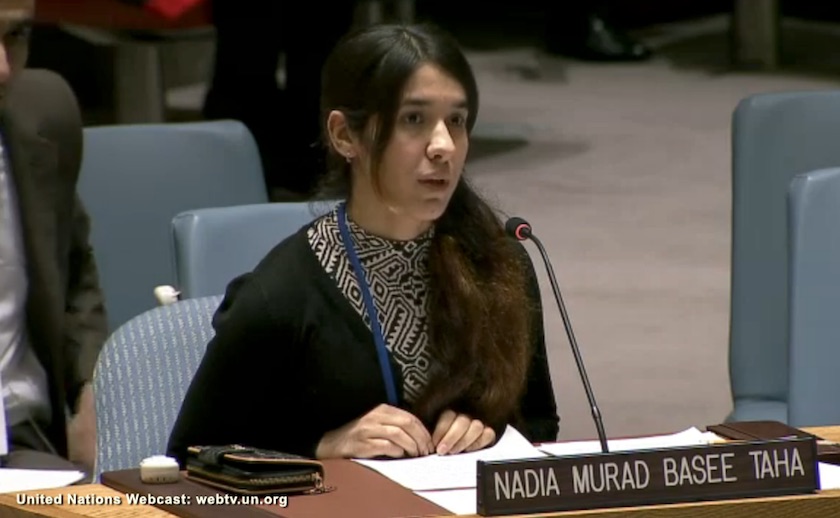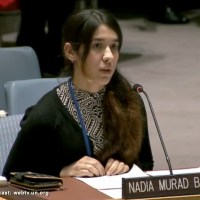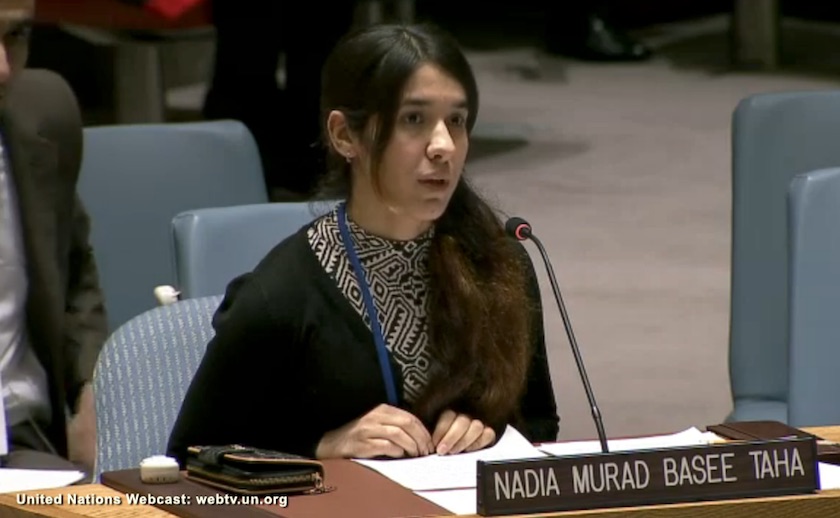
“Animals.”
“Not human.”
“Unbelievers.”
“Satan worshippers.”
If you want to justify killing someone, dehumanize them. Make them less-than. It’s much easier to end someone’s life if you pretend they’re a worm. As a Yazidi woman caught in the war path of ISIS, Nadia Murad knows this all too well.
By August 2014, ISIS had fully captured Nadia’s village. She and her Yazidi family were rounded up, along with others. The men were separated from the women and children, and were systematically slaughtered.
In less than an hour, Nadia saw 312 men murdered in her home village of Kocho. Six of them were her brothers. Then the women and children were rounded up and bused to markets in Mosul to be sold and traded. As Nadia told the UN Security Council last December:
[ISIS] did not just come to kill our women and girls, but they took us as…merchandise to be exchanged. Rape was used to destroy women and girls and to guarantee that these women could never lead a normal life again.
According to Nadia, those who attacked her village came not to commit random acts of violence, but to destroy their identity—to wipe them out:
These crimes were not committed in an arbitrary fashion. It was an organized, planned policy. [ISIS] came with one aim: to destroy the Yazidi identity through forced rape, through the recruitment of children, and the destruction of all of our temples.
On the way to Mosul, Nadia suffered more dehumanizing treatment. “They humiliated us,” she said. “They violated us.”
She endured rape and abuse. She knew first-hand about the punishment for trying to escape. After one failed attempt, Nadia was beaten and gang raped by six militants. “They continued to commit crimes to my body until I became unconscious,” she said.
According to Nadia, unwanted women were executed, just like their husbands and brothers.

She eventually managed to escape, but the trauma—and its dehumanizing effect—lingers:
[ISIS] has made Yazidi women into flesh to be trafficked in. I very much hope that [their] humanity has not yet disappeared.
This is the final victory of the dehumanizer: when we finish, even you won’t believe you’re human anymore.
Thousands of Yazidi women like Nadia have endured trauma that will never leave them. Many are experiencing it today, right now. The thought of it is painful enough to unmake us.
We love to share hopeful, surprising stories of preemptive love—stories like this. And this. And this. But stories like Nadia’s have to be shared, too. The grief and outrage they cause in us has to be experienced.
They call on us to lament the brokenness of our world, rather than rush past it. They remind us how dangerous it can be when we allow dehumanizing language and beliefs to creep into our lives.
Today, Nadia is using her voice to raise awareness of the Yazidi plight. Last month, she was nominated for the Nobel Peace Prize for her humanizing work in and for Iraq.
You are part of that humanizing work, too.
You can reject the belief that anyone is less-than, including persecuted minorities and, yes, even the militants who target them.
You can say no to the dehumanizing effects of fear and hatred. You can help those who’ve been targeted by ISIS as they reclaim their humanity—by providing emergency relief, empowerment grants for those seeking to rebuild, education for displaced children, and peacemaking in active conflict zones.
Nadia’s story is not easy to hear. The horror might tempt us to look away, to find something easier to deal with. But you’ve stared death, pain, and despair in the face before and chosen to love anyway. Are you ready?


